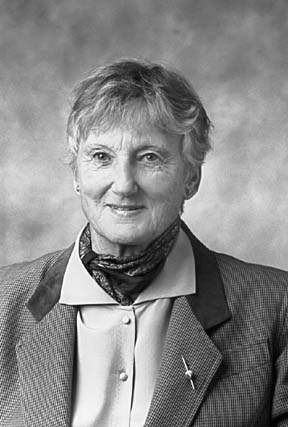
Professor emerita of educational studies Margaret Gillett wins Governor General's Award
November 7, 1996
by Daniel McCabe
 Professor emerita of educational studies Margaret Gillett wins Governor General's Award |
Ever since Margaret Gillett was an undergraduate in her native Australia, she has been drawn to women's studies. Even back when there was no such thing--at least officially. "When I was studying at the University of Sydney, I wrote essays for my English courses about Shakespeare's heroines and my essays for history were about the suffragette movement. There was no shortage of interesting topics that dealt with women."
What appeared obvious to Gillett proved to be a tough sell, however. As a McGill professor of education years later, Gillett struggled to persuade a reluctant University establishment that women's studies was an academic area worthy of support.
"Back then, no one dared use the word 'woman' in a course," recalls Gillett. "It was a very dirty word. You could never get it by a curriculum committee. Courses or research projects focusing on women were looked upon as specious."
A cursory look at McGill courses today points to a much changed academic environment. Students can now major in women's studies and dozens of departments offer courses that focus on women.
Gillett is quick to direct the credit for these developments elsewhere, but there is no denying she played a major role in fostering change. "If somebody put together a history of women's studies in Canada, Margaret would be a very important part of such a study," asserts Jacqueline Reid-Walsh, a professor in the Department of Educational Studies.
Reid-Walsh isn't alone in that assessment. The Canadian government agrees. "Working within an often sceptical and hostile environment, [Gillett] succeeded in her ground-breaking efforts to have women's studies acknowledged as a legitimate field of study at Canadian universities, as well as contributing to the body of knowledge related to women's historical contributions to Canada."
Those words are from a citation prepared by Status of Women Canada which accompanied the announcement that Gillett was one of five women chosen to receive the 1996 Governor General's Award in Commemoration of the Persons Case.
The prize honours individuals who have made outstanding contributions towards promoting the equality of women in Canada. It's named for the long legal and politcal struggle in the 1920s for the right of women to be recognized as "persons." Gillett was at Rideau Hall in Ottawa two weeks ago to receive the prize from Governor General Romeo LeBlanc.
Gillett was the first chair of McGill's Senate Committee on Women when it was founded in 1977. She played the lead role in creating McGill's women's studies minor two years later. When the McGill Centre for Research and Teaching on Women was established, Gillett became its first director in 1988.
She has written, edited or collaborated on several influential books and articles dealing with the history of women and their access to education, including We Walked Very Warily, A Fair Shake, and Our Own Agenda.
"Her history of women at McGill (We Walked Very Warily) was probably the first institutional history of women at universities," says Reid-Walsh. "Now when I read publishers' catalogues, most of the major universities and many of the smaller universities have published similar books. She started a whole trend in research."
Gillett remembers working with women like Professor Janet Donald from the Centre for University Teaching and Learning in the 1970s in an effort to prove to the administration that exciting and relevant scholarship on women could not only be done, it had already been done. "We went digging through old theses and course descriptions and we found all sorts of interesting work--[scholars] were writing about women at the turn of the century.
"It was a tough battle and I should say that many men were among our staunchest allies. [English professor] Irwin Gopnik did a great deal of work towards setting up the Senate Committee on Women, for example. I can only imagine the kind of flack they received from some of their colleagues."
Recent books by women such as Kate Riophe, Camille Paglia and Christina Hoff Sommers accuse the feminist movement of becoming whiny and strident.
Gillett is sympathetic--up to a point. "If these women are saying that we can't just wallow in our misery, that we have to take pride in what we've accomplished and build from there, then I have no quarrel with that.
We have come a long way, but there is still much work to be done. For instance, acts of violence against women still occur at alarming rates.
"I really take exception to criticisms of feminists as being 'strident,' however," Gillett continues. "'Strident' has become such a nasty word to hurl at someone. I think we should all be grateful to the women who spoke boldly. There's a limit to how much you can get done with a lady-like approach. When you want to shake people out of their prejudices, you have to be more than polite. I wish I were a little bit more strident sometimes."
Currently a professor emerita, Gillett still keeps an office at McGill. She recently updated A Fair Shake, which features new essays by the women who ap-peared in the original book such as linguistics professor Myrna Gopnik, Ms magazine contributor Gretta Nemiroff and Quebec Provincial Court judge Claire Kirkland-Casgrain. She's working on a new book, a his-tory of the Trafalgar School for Girls.
"Women's studies programs have been around for about 25 years in Canada now," muses Jacqueline Reid-Walsh. "It's about time we looked at the history surrounding them--where they came from and where they're going. That would be a great project for someone to work on."
Sounds like a job for Margaret Gillett.